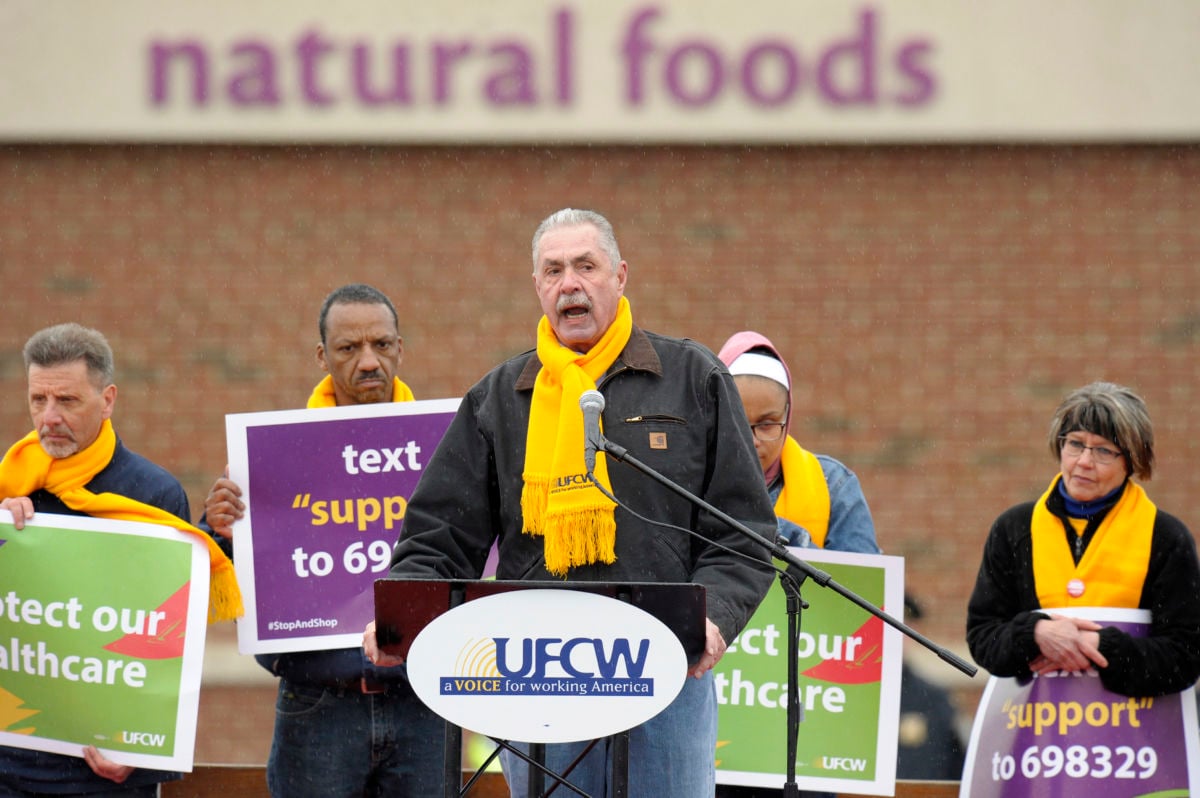The current New England grocery workers’ strike will likely have long-lasting national significance. The strike that started April 11 with 31,000 Stop & Shop grocery workers at about 240 supermarkets in Massachusetts, Rhode Island and Connecticut is about to enter its second week. It is the largest private-sector strike in the United States since 2017 and the largest strike in the U.S. retail sector since the Southern California grocery workers’ strike of 2003-2004.
The strike is an important political event. Over the past few days, several Democratic presidential candidates, including Sen. Elizabeth Warren, Sen. Corey Booker, Sen. Bernie Sanders and former Vice President Joe Biden, have expressed support for the strikers, with Warren, Biden and other state and national politicians, including a couple of Republican lawmakers, meeting with workers, who are members of the United Food and Commercial Workers Union, on the picket lines. On Thursday, Biden and Boston Mayor Marty Walsh headlined a rally for striking workers in Dorchester, Massachusetts.
The striking workers have also gained support from other quarters of the labor movement. Almost 2,000 Teamsters who work as truck drivers for Stop & Shop or its vendors and suppliers are refusing to make essential food deliveries during the strike, leading to bare shelves, early closings and shuttered stores. Virtually no Stop & Shop workers have crossed the picket lines – local management and “striker replacements” are attempting to do their work — and formerly loyal customers are staying away in droves. Coming during the critical Easter holiday retail period, the Stop & Shop strike threatens to hurt the finances of the company, which generated $44 billion in sales from all its U.S. supermarket chains in 2018.
The workers are fighting against sweeping contract concessions demanded by Shop & Shop (owned by the Dutch giant Ahold Delhaize, which was formed in July 2016 from the merger of two existing retailers). The outcome of the strike will have national implications: If the company succeeds in weakening the workers’ health care and pension plans, and lowering the rate for Sunday pay, it will try to impose concessionary contracts on its workers in other states (New York State has more than 200 Stop & Shop stores, and the company also owns the Giant and Food Lion grocery chains). A management victory would also give encouragement to other unionized food retailers seeking to reduce costs and boost profits by slashing employee benefits.
Stop & Shop management claims that it needs these health care and pension concessions and cuts in Sunday pay in order to compete with nonunion grocery chains – its major competitors include nonunion Walmart, Target and Aldi, as well as union grocery chains such as Kroger — but the evidence suggests otherwise. According to a 2017 analysis by Credit Suisse, the company “dominates most of the US metropolitan markets in which it operates – a key factor in maintaining high margins. Even if competition increases and shopping habits change, the company’s market positioning and competitive history support our [optimistic] revenue and margin forecasts.” Credit Suisse also notes the Dutch-owned food retailer boasts “best-in-class free cash flow generation and a history of returning cash to shareholders.”
Thus, Stop & Shop management wants to cut workers’ health and pension benefit plans in order to reduce costs and give even more money to its major investors, but the company does not need to do so in order to remain profitable. Management is essentially seeking to make more short-term profits for its shareholders off the backs of its lowest-paid and most vulnerable workers, many of whom have given years or even decades of service to the company.
This type of fear-mongering by large grocery chains in order to win contract concessions is not new. When supermarket chains in Southern California demanded sweeping concessions in an enormous dispute in 2003, they blamed competition from Walmart, even though Walmart’s presence in the grocery sector was fairly minimal in the region 20 years ago. Now unionized grocery chains such as Kroger are demanding benefit concessions because of alleged competition from Amazon (which purchased Whole Foods grocery chain for almost $14 billion in 2017), but in terms of customer demographics, Whole Foods provides little direct competition to Kroger. Thus, the issue is not really the competition that Stop & Shop and Kroger face from Walmart and Amazon; rather, it’s their desire to adopt the same low-road practices of poverty-level wages and lousy benefits.
The Stop & Shop strike is a depressingly familiar story of a rapacious foreign-owned corporation that deals with unions at home but takes advantage of its vulnerable U.S. workforce. American labor laws provide few protections for hard-working employees under such circumstances. But New Englanders are not the kind of people who will look kindly upon the company’s astounding greed. It’s time to tell the company’s U.S. and Dutch management that Stop & Shop workers deserve a fair settlement.
Trump is silencing political dissent. We appeal for your support.
Progressive nonprofits are the latest target caught in Trump’s crosshairs. With the aim of eliminating political opposition, Trump and his sycophants are working to curb government funding, constrain private foundations, and even cut tax-exempt status from organizations he dislikes.
We’re concerned, because Truthout is not immune to such bad-faith attacks.
We can only resist Trump’s attacks by cultivating a strong base of support. The right-wing mediasphere is funded comfortably by billionaire owners and venture capitalist philanthropists. At Truthout, we have you.
Truthout has launched a fundraiser, and we have only 24 hours left to raise $15,000. Please take a meaningful action in the fight against authoritarianism: make a one-time or monthly donation to Truthout. If you have the means, please dig deep.
